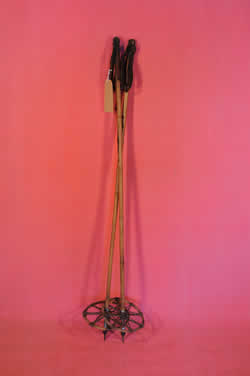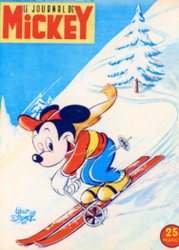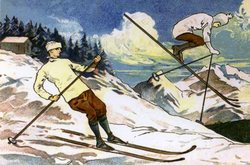
The Scottish Mountain Heritage Collection
Objects Database
Ski poles
Accession Number
789.2009.1
Object Name
Ski poles
Created
26/01/2009
Creator
Hermione Cooper
Accession Date
26/01/2009
Brief Description
Pair of cane ski poles with cane and leather baskets. Brown leather straps in poor condition. Aluminium and leather spikes.
Materials
cane, leather, metal, aluminium
Dimensions
120 (l) x 6 (circumference) cms
Number Of Objects
1 pair
Colour
brown
Provenance
The modern day skier might be surprised to learn that two ski sticks are a fairly recent idea - skis have been around for thousands of years, two sticks only becoming the norm just over 100 years ago. Skiing as a sport didn't really begin until the 1860's and at that time a single pole was the norm being used to 'pole' along on the flat, ride upon to check the speed when going downhill and to 'swing' on when doing turns. Although the Finns had been using two poles for a long time the Norwegians actually banned them in some of their early competitions.
By around 1910 two sticks were becoming the norm and Scottish Ski Club Journals from that era ran articles on how to make them. Hazel and ash was the timber of choice in the early days; this was gradually replaced with cane as it became more commercially available. The sticks themselves were quite straightforward though the snow baskets were often mini-masterpieces.
Glass fibre, plastic,aluminium and carbon fibre were some of the materials that brought us into the twenty first century - better in many ways but somewhat lacking in character!
This little set of cane poles are characterised by rather larger than usual baskets which would be great in deep powdery snow. An educated guess says 1950's or 60's and whilst they look professionally made we can't find any name to give us a clue.
Acquisition Date
26/01/2009
Condition Check Date
28/04/2009
Normal Location
Bohuntin
Current Location
Bohuntin
Rules
Spectrum : UK Museum documentation standard, V.3.1 2007
Modified
28/04/2009



